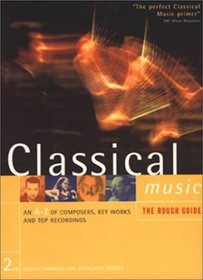Exactly what the title sounds like. Great start to finding great recordings
Search -
The Rough Guide to Classical Music
The Rough Guide to Classical Music
Introduction Though few of them make much effort to entice a new audience to their product, the recording companies continue to pour out a flood of classical music. The catalogue of current classical CDs runs to more than two thousand tightly packed pages, and lists nearly three hundred composers before reaching the second letter of the alpha... more »
Introduction Though few of them make much effort to entice a new audience to their product, the recording companies continue to pour out a flood of classical music. The catalogue of current classical CDs runs to more than two thousand tightly packed pages, and lists nearly three hundred composers before reaching the second letter of the alpha... more »
ISBN-13: 9781858282572
ISBN-10: 1858282578
Publication Date: 10/1/1998
Pages: 505
Edition: 2
Rating: 3
ISBN-10: 1858282578
Publication Date: 10/1/1998
Pages: 505
Edition: 2
Rating: 3
4.3 stars, based on 3 ratings
Publisher: Rough Guides
Book Type: Paperback
Members Wishing: 0
Reviews: Member | Amazon | Write a Review
Book Type: Paperback
Members Wishing: 0
Reviews: Member | Amazon | Write a Review
Please Log in to Rate these Book Reviews
Genres:
- Reference >> Publishing & Books >> Bibliographies & Indexes >> Music
- Reference >> Publishing & Books >> Bibliographies & Indexes >> History
- Reference >> General
- Humor & Entertainment >> Music >> Reference >> General
- Humor & Entertainment >> Music >> General
- Humor & Entertainment >> Music >> Musical Genres >> Classical >> General




